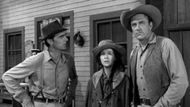Some TV shows become more than just stories. They turn into daily habits, cherished companions, and a source of comfort for many people. Not only do these shows leave blank spaces on our screens when they conclude, but they also leave a legacy of melancholy and longing.
Here are ten classic TV shows that had a lasting impact, and their cancellations left many fans feeling lost and heartbroken.
Disclaimer: This article is based solely on the writer's opinion. Reader discretion is advised.
The list of 10 classic TV shows that felt like a lifetime and left a void when they ended is given below:
10. Deadwood (2004)

Deadwood was a Western and crime TV show set in the lawless town of South Dakota. This TV show developed an intricate world with rich characters and multidimensional dialogue in three seasons. The story was not completed because HBO abruptly canceled it in 2006. The TV show did not conclude crucial storylines such as the town's power politics or the predetermined fate of characters like Al Swearengen.
There was no concluding sequence to wrap things up. There was no farewell or closure, leaving the fans hanging. Deadwood's ending felt more like a close than a conclusion. The spectators experienced a real emptiness after spending years in this world and with its inhabitants, as if an actor had abruptly and without their permission taken away a part of their daily lives.
9. Lost (2004)

Lost became an intriguing TV show because its main characters were a mysterious island and a group of people. The final scene implied a shared afterlife by demonstrating how the characters' states of consciousness during the scenes differed greatly from how people from different eras appeared. All of the characters remembered their past lives, met in a church, and continued together. The ending provided an emotional closure for the main cast.
However, fans were disappointed because too many mysteries about the island, such as its origin, what it had to offer, and why children could not be born on it, remained unsolved. The degree of mystery captivated the crowd. Thus, it is understandable that, while the emotional finale was moving, there was an empty feeling when plot resolution was attempted. After six seasons of suspense and puzzles, the climactic scene left fans wanting more.
8. Dexter (2006)

Dexter is a forensic expert who kills murderers in secret. Dexter arranged his death to save his son and fiancée, as the final scene shows. His driving into a hurricane and his emergence later as a lonely lumberjack in the Pacific Northwest is what happened. The tone of the climax was not one of victory. Fans claim that it appeared hurried, that the questions remain unanswered, and that the motivations are not genuine. Audiences expressed their frustration with the conclusion, saying it left them feeling "empty" and "f***ing." The voice-over encapsulates it:
“I destroy everyone I love … I have to protect them from me.”
The ending of Dexter felt more like a hollow exile than true closure, due to the lack of a significant emotional payoff and the uncertainty surrounding his destiny, as well as the sudden transition into exile.
7. The Office (2005)

The Office was a mock documentary TV show of the ordinary employees in a paper company. Its final moments included Dwight's wedding, a final puzzle quiz show, and the future lives of each character. Michael Scott made a brief appearance. During the last talking-head interviews, characters told what they had learned and what they had planned to do next. Several critics found it extremely satisfying and warm, despite the uneven late seasons.
Fans of The Office expressed that the show filled a gap during tough times, making them feel less alone. After the finale aired, they shared that it felt like losing real friends. The ending was as every good, but sad, farewell is, and people are still missing the touch and lightness of visiting Dunder Mifflin at least once a day.
6. Mad Men (2007)

Mad Men is a TV show that follows Don and Ben Draper through the 1960s advertising world. In the final scene, Don travels to California for a group therapy retreat, and he is brought to tears when a stranger named Leonard delivers a moving speech. Don embraces him and appears to become calm. The show does not explain whether Don actually changes. In the last episode, there is a Coca-Cola commercial that Don could have made. It was a melancholic and poetic conclusion.
Fans had been following Don's story for years and had become quite devoted to it. They felt somewhat relieved when it was over, but they also felt empty because Don had left something just out of their grasp—some aspect of his inner life that they were unable to access.
5. Buffy the Vampire Slayer (1997)

Buffy the Vampire Slayer is a supernatural and action-packed TV show that follows the lives of teens. This TV show is based on the life of Buffy Summers, a vampire slayer. Finally, in the last episode, Buffy directs his friends and even her predecessors to battle a monster. She sacrifices her happiness to accomplish good for the world. In the final scene, she is in a new, liberated life, but she is alone after losing so much.
Fans believed that the climax marked the end of a long journey. Buffy had developed over seven seasons, and viewers felt like they had as well. Many viewers missed the group camaraderie and the daily blend of heart and action when it was discontinued. Although the final sacrifice seemed valiant, it also left a gap in the viewers' lives where Buffy's life had been.
4. The Sopranos (1999)

The Sopranos is a crime TV show about mafia boss Tony Soprano trying to strike a balance between family and crime. In the final scene, Tony is having dinner with his family. Every new face and cringe-worthy bell raises tension. The screen goes black and silent as soon as his daughter opens the door, signaling the impending disaster. This duped Ned into Tony's death.
The fans were shocked, as if their abilities had been taken away. The abrupt ending became classic. David Chase desired to convey the impression of life's uncertainty. Viewers debated who was alive/dead and what that meant. This fuzziness enhanced the show's atmosphere. Eight years later, and without a proper send-off, the fans have a permanent gag because the audience was never given a proper closure.
3. Breaking Bad (2008)

Breaking Bad is a TV show about Walter White, a former chemistry teacher turned meth kingpin. In the last scene of Felina, Walt goes back to save Jesse, murders his opponents, faces his faults, and dies in a chemical factory of meth production. He supports his family financially and admits to Skyler that he did so to benefit himself. The majority of storylines have been resolved, and Jesse has the opportunity to become free in this episode.
The audience believed that Walt received his deserved ending. However, years later, fans were left hollow as well after he had ridden his moral downfall. The end of Walt was pathetic yet tragic. The show was about a complicated man on a long journey, and the fans had to bear the weight of both grief and farewell at the end of that chapter.
2. Supernatural (2005)

Supernatural's 15 seasons follow the exploits of Sam and Dean Winchester, two monster-hunting brothers. Dean is gently killed in the final scene of this TV show during what appears to be a normal hunt, with him pleading with Sam to tell him everything is fine and he can continue. He falls into Sam's arms. Then there's Dean in peaceful heaven, where he meets his old friends and enjoys his lovely Impala.
Sam begins a family and has a son named Dean. He ages over time and eventually passes away from natural causes. When he finally reaches paradise, he embraces Dean on a bridge. The end marks the end of their odyssey. After years of traveling with the twins, fans, on the other hand, felt both deeply impacted and devastated. When Dean died suddenly and Sam at last found peace, it felt like the end of a long journey.
1. Gunsmoke (1955)

The main character in the 20-year-old Dodge City set of Gunsmoke was Marshal Matt Dillon. When Festus was working on local property issues in a lighthearted episode that had nothing to do with the plot, this TV show was abruptly discontinued in 1975. CBS had already cancelled the show without warning, and the final episode did not wrap up major characters or storylines. There was no farewell scene or reflection on the twenty years spent in Dodge. The conclusion came very suddenly.
The characters had captivated fans for generations. The fans experienced a lull after the show ended without finishing. Years of devotion were ultimately lost with a story that simply died. We all understandably felt that something was lost when there was no proper farewell, even if we were unaware that it was a part of our lives.
Thus, we concluded that such TV shows had existed over the years and had become our habits and memories. They marked the end of journeys we had become accustomed to, either emotionally or abruptly. When the black screen appeared, a part of our bond dissolved, leaving us in an all-too-personal silence.
Love movies? Try our Box Office Game and Movie Grid Game to test your film knowledge and have some fun!
